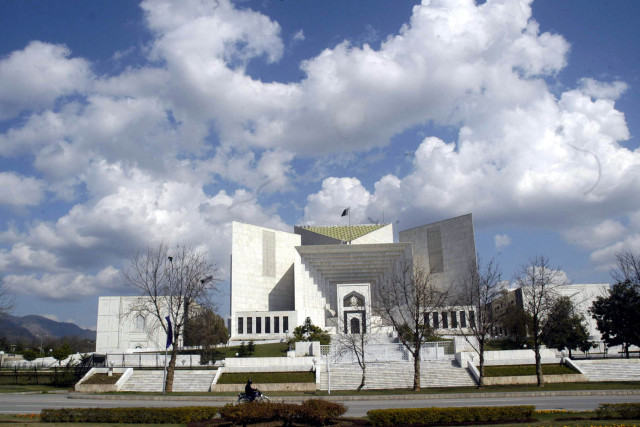21st Constitutional Amendment: 85% cases were pending in ATCs in 2014, says AGP
Salman Aslam Butt says he will provide a CD regarding terrorist activities today

The Supreme Court of Pakistan. PHOTO: TMN
During the hearing of the 21st Constitutional Amendment case, he, however, remarked that waging of war is a crime under Section 121 of the Pakistan Penal Code. “Tell the court how many challans have been submitted in the courts and the situation of trial and why the prosecution failed to proceed in terrorist cases.”
On the other hand, Attorney General for Pakistan (AGP) Salman Aslam Butt informed the court that last year 85% of cases were outstanding in anti-terrorism courts (ATCs), but didn’t give the reasons as to why so many cases were pending.
He said he would provide a CD regarding terrorist activities on Wednesday (today).
However, the chief justice told him that there were two types of cases pending in the ATCs. The first one related to militants and the second ones were only technically classed as terrorism-related. Most of the pending cases in the ATCs were of the latter category.
The AGP contended that the threat was so grave that the federal government did not want to take risk. Justice Jawwad S Khawaja remarked: “We are judges and not concerned about the gravity and it is the executive that should see into it what is grave and what is not?”
The executive has the authority to invoke Article 245 in view of the gravity and they (judges) only wanted to know why there was a need to amend the Constitution. And whether the amendment could be made or not? the judge questioned.
Justice Dost Muhammad stated: “There was a graver situation four years ago as the terrorists flew their flags in 95% of Swat. In view of that the army chief met the prime minister at midnight and decided to launch the operation in Swat that lasted a few months and the armed forces were able to eliminate the terrorists from Swat.”
He pointed out that the situation was normalised not only in Swat but also in North Waziristan, Khyber Agency, Bajaur Agency and many parts of the frontier region, adding that the civil administration was empowered again and the writ of the government was established in those areas.
The judge said at that time no military courts were established. “The military was called under Article 245 of the Constitution to aid the civil authority.”
Published in The Express Tribune, June 24th, 2015.



















COMMENTS
Comments are moderated and generally will be posted if they are on-topic and not abusive.
For more information, please see our Comments FAQ